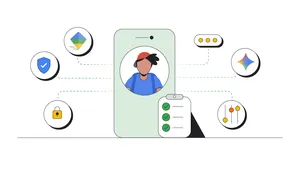Google Launches AI Glossary for African Languages

The rapid advancement of artificial intelligence (AI) is transforming our world, but for many in Africa, the lack of standardized terminology in local languages for emerging AI and tech concepts is a significant barrier. This can hinder awareness and slow the adoption of these technologies. At Google, we believe that empowering African users to engage in the AI conversation in their own languages is critical to meeting this moment.
To address this challenge, Google in collaboration with key stakeholders launched a project to develop and standardize a glossary of 100 AI terms and their definitions in 4 African languages, starting with Swahili for the East Africa region, and Afrikaans, Xhosa and isiZulu for South Africa, the goal being to drive African user understanding and engagement by removing language-related barriers, which in turn will help spur growth, mitigate risks, and bridge the digital divide.
How We Built It: A Collaborative Approach
Upon compiling a list of 100 AI terminologies and their definitions - terminologies that would feature in a conversation about AI - we collaborated with Twaweza Communications to organize round-table discussions and a multi-day workshop for Swahili with language experts, linguists, lexicographers, AI experts, educational institutes, government entities, and other key stakeholders from 5 countries within the region - DR Congo, Kenya, Rwanda, Tanzania & Zanzibar, and Uganda. These participants represented key Language stakeholders within Africa including Swahili language bodies (BAKITA, BAKIZA, CHAKITA), Africa Academy of Language (ACALAN), UNESCO, media, curriculum development bodies (KICD), Swahili Tech Content Developers and several universities.
For South African languages, we partnered with Pan South African Language Board (PanSALB) and through their Afrikaans, isiXhosa and isiZulu National Language Boards (NLBs), we were able to localize these three South African languages.
These collaborations were crucial for building consensus and including diverse and authoritative views on the translation and vetting of these AI terminologies.
The Final Glossary: Access and Impact
The final list is uploaded in github and can be accessed through this link. Here is a look at how key terms like Artificial Intelligence, Chatbot, and Deepfake were localized across the four languages:

With the terms finalized, they are ready for user consumption. A soft launch and dissemination of the standardized terms has been done on GitHub, where they will be publicly available. The goal is to make them easy to disseminate and to be adopted in AI conversations and language resources.
This project creates a tool for user education and pushes the standardization conversation in the right direction for approximately 266M speakers of the 4 languages within the continent and beyond (Swahili - 200M, isiZulu - 28M, isiXhosa - 21M, Afrikaans - 17.2M). It is a tangible way for Google to demonstrate our commitment to users and languages in Africa.
We invite researchers, educators, developers, translators & interpreters, policy makers, and language enthusiasts to access the full glossary from GitHub and begin using these terms in your conversations, curricula, and technology. This is how we collectively bridge the digital divide.






